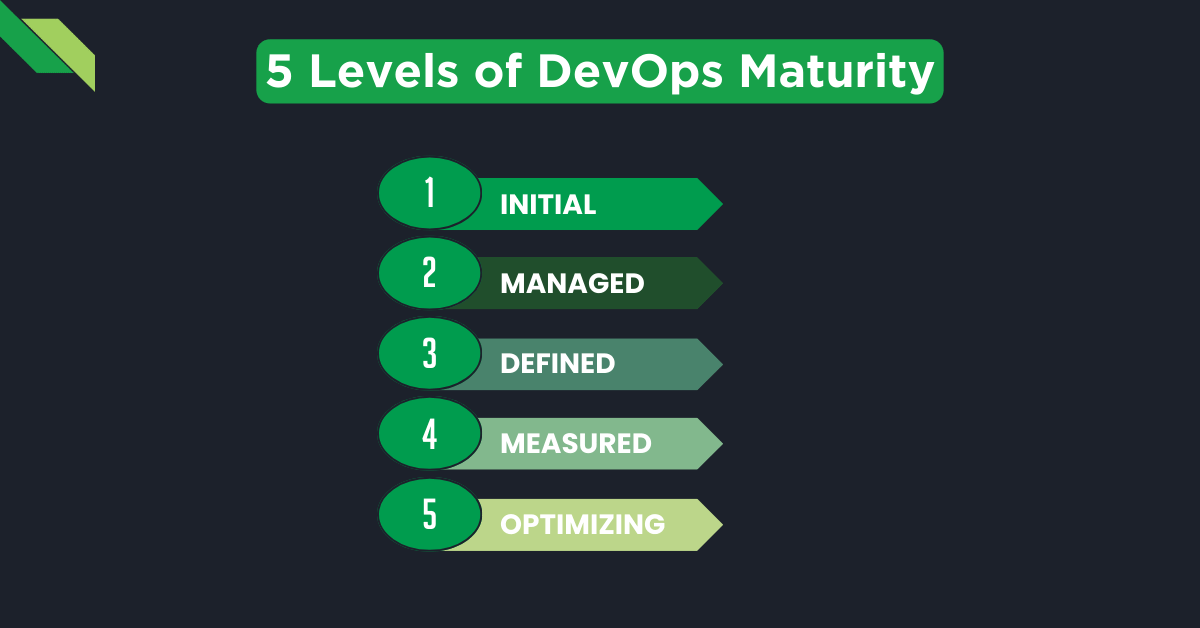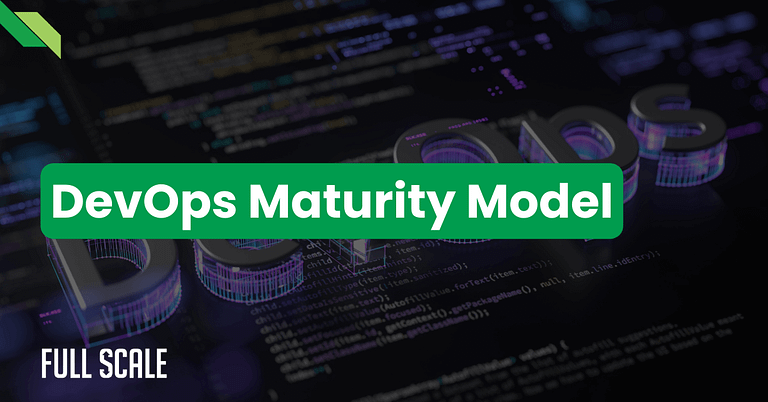Last Updated on 2024-10-11
Software development has become a critical driver of business success.
And you, as a founder considering outsourcing software development, understand the importance of delivering high-quality products quickly and efficiently.
That’s where DevOps comes in—a revolutionary approach that brings together development and operations teams to streamline processes, foster collaboration, and accelerate software delivery.
The DevOps Maturity Model is at the heart of this transformative methodology. It’s a powerful framework to assess your current practices, identify areas for improvement, and unlock your team’s full potential.
What is the DevOps Maturity Model?
Before discussing the DevOps Maturity Model, let us first define DevOps.
DevOps is a set of practices that combines software development (Dev) and IT operations (Ops) to shorten the development lifecycle. And provide continuous delivery with high software quality.
By fostering collaboration, automation, and a culture of shared responsibility, DevOps enables organizations to:
- Accelerate time-to-market
- Improve software reliability and quality
- Enhance collaboration and communication
- Increase efficiency and reduce costs
DevOps Maturity Model
The DevOps Maturity Model is a framework for assessing an organization’s DevOps practices and providing a roadmap for continuous improvement.
It helps companies identify their current level of DevOps adoption and guides them towards higher maturity levels.
Why is the DevOps Maturity Model Important?
Adopting the DevOps Maturity Model enables organizations to:
- Benchmark their current DevOps practices against industry standards
- Identify areas for improvement and prioritize initiatives
- Align DevOps efforts with business goals and objectives
- Measure progress and demonstrate the value of DevOps investments
Levels of DevOps Maturity

A DevOps maturity model consists of levels indicating an organization’s proficiency in DevOps practices.
The levels progress from basic, informal practices to more sophisticated, automated processes.
1. Initial (Level 1):
- Ad-hoc processes and manual tasks dominate
- Siloed teams with little collaboration
- Inconsistent development practices and long release cycles
2. Managed (Level 2):
- Basic automation and version control are in place
- Some collaboration between teams, but still largely siloed
- Defined processes but not consistently followed
3. Defined (Level 3):
- Standardized processes and tooling across the organization
- Continuous integration and automated testing implemented
- Collaboration and communication have become the norm
4. Measured (Level 4):
- Continuous delivery and deployment practices in place
- Proactive monitoring and data-driven decision-making
- Focus on performance optimization and scalability
5. Optimizing (Level 5):
- Continuous improvement and experimentation
- Self-service infrastructure and automated provisioning
- Culture of innovation and learning
How to Measure DevOps Maturity?
Assessing your organization’s DevOps maturity involves evaluating various aspects of your development process, such as:
- Automation: The extent to which manual tasks are automated across the development lifecycle
- Collaboration: The level of communication and shared responsibility between development and operations teams
- Continuous Integration and Delivery: The adoption of practices that enable frequent, reliable software releases
- Monitoring and Feedback: The ability to proactively monitor performance and gather actionable insights
- Culture and Mindset: The embrace of DevOps values, such as collaboration, experimentation, and continuous learning
Benefits of the DevOps Maturity Model
The DevOps Maturity Model is useful for assessing an organization’s DevOps team status.
It offers numerous business advantages:
- Faster Time-to-Market: Streamlined processes and automation enable rapid software delivery
- Improved Software Quality: Continuous testing and monitoring catch issues early, reducing defects
- Increased Efficiency: Automation and standardization eliminate manual tasks and reduce waste
- Better Collaboration: Shared responsibilities and communication foster a culture of cooperation
- Enhanced Customer Satisfaction: Faster, more reliable software delivery meets customer expectations
Best Practices of the DevOps Maturity Model
When adopted, DevOps provides many benefits. Although it includes novel methods to enhance processes, DevOps hurdles are not entirely unfamiliar.
The following outlines some of the most effective DevOps principles:
- Automate Everything: Embrace automation across the entire development lifecycle, from build to deployment
- Foster a DevOps Culture: Encourage collaboration, experimentation, and continuous learning
- Implement Continuous Integration and Delivery: Establish pipelines that enable frequent, reliable releases
- Leverage Serverless Architecture: Embrace serverless computing for scalability and cost-efficiency
- Monitor and Measure: Use data and insights to drive continuous improvement and optimize performance
Your business needs a DevOps Maturity Model to optimize its infrastructure. Choosing the right model and evaluating metrics can be challenging.
That’s why partnering with DevOps experts can lead to efficiency, faster time to market, and other benefits.
Full Scale is Your Right Partner for DevOps Software Development
At Full Scale, we deeply understand the power of DevOps and have made it an integral part of our development process.
Our experienced team of developers follows industry best practices to deliver high-quality software quickly and reliably.
With Full Scale, you can:
- Access a talented pool of developers with expertise in various technologies and domains
- Seamlessly integrate our team with your existing processes and tools
- Benefit from our proven track record of successful project delivery and client satisfaction
- Leverage our cost-effective solutions tailored to your specific business needs
- Embrace our commitment to continuous improvement and staying at the forefront of DevOps best practices
By partnering with a trusted provider like Full Scale, you can harness the power of DevOps and gain access to a team of skilled developers who can help you achieve your business goals.
Hire Full Scale Developers

Matt Watson is a serial tech entrepreneur who has started four companies and had a nine-figure exit. He was the founder and CTO of VinSolutions, the #1 CRM software used in today’s automotive industry. He has over twenty years of experience working as a tech CTO and building cutting-edge SaaS solutions.
As the CEO of Full Scale, he has helped over 100 tech companies build their software services and development teams. Full Scale specializes in helping tech companies grow by augmenting their in-house teams with software development talent from the Philippines.
Matt hosts Startup Hustle, a top podcast about entrepreneurship with over 6 million downloads. He has a wealth of knowledge about startups and business from his personal experience and from interviewing hundreds of other entrepreneurs.





